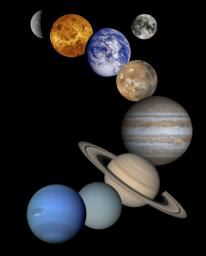WHY ARE PLANETS ROUND?
Derek Sears, professor of cosmochemistry at the University of Arkansas, explains.
Planets are round because their gravitational field acts as though it originates from the center of the body and pulls everything to...ward it. With its large body and internal heating from radioactive elements, a planet behaves like a fluid, and over long periods of time succumbs to the gravitational pull from its center of gravity. The only way to get all the mass as close to planet's center of gravity as possible is to form a sphere. The technical name for this process is "isostatic adjustment."
With much smaller bodies, such as the 20-kilometer asteroids we have seen in recent spacecraft images, the gravitational pull is too weak to overcome the asteroid's mechanical strength. As a result, these bodies do not form spheres. Rather they maintain irregular, fragmentary shapes. Hare Krishna
Image: NASA/JPL
Derek Sears, professor of cosmochemistry at the University of Arkansas, explains.
Planets are round because their gravitational field acts as though it originates from the center of the body and pulls everything to...ward it. With its large body and internal heating from radioactive elements, a planet behaves like a fluid, and over long periods of time succumbs to the gravitational pull from its center of gravity. The only way to get all the mass as close to planet's center of gravity as possible is to form a sphere. The technical name for this process is "isostatic adjustment."
With much smaller bodies, such as the 20-kilometer asteroids we have seen in recent spacecraft images, the gravitational pull is too weak to overcome the asteroid's mechanical strength. As a result, these bodies do not form spheres. Rather they maintain irregular, fragmentary shapes. Hare Krishna
Image: NASA/JPL

No comments:
Post a Comment